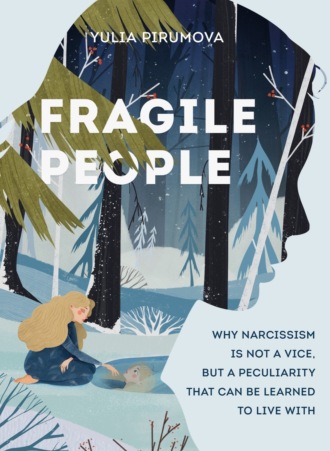
Полная версия
Fragile People: a Hidden Door into the World of Narcissists
Narcissists demand grandiosity and fulfillment of the ideal image from themselves due to one very simple reason. They are not aware of any other ways of not feeling inferior. Our mind creates an illusion that it is the only way to escape the unbearable suspicion about how inferior we actually are. But here lies a trap, since it is exactly the way we open the gates of hatred to ourselves. Therefore, our “fragility” is only enhanced. So, how do we actually do it?
Narcissistic ways of treating oneself
Therefore, to be a narcissist is to constantly contempt or even despise one's real self as compared to the ideal image, which is so hard to attain. To suffer from humiliation and the feeling of being inferior, to be afraid of being rejected or unmasked. To run in circles, with a growing number of demands to oneself, while satisfaction and peace are waning…
Narcissists display a variety of ways of abusive self-treatment. We can say that it is the very reason why their self, which is far from stable, is being diminished, while they are running in narcissistic circles of “I must be the best; otherwise I'm a loser”.
We berate our virtues and human qualities; our achievements and the existing results.
We devalue all that we have inside that we could rely on.
We berate our creative energy, destroying with perfectionism all the impulses that hardly ever come out.
We berate certain parts of ourselves, for instance, a dependent, a loving, a gentle, a relaxed, a needy one, etc.
We scold ourselves for still needing someone and wanting to depend on people, although we should have long forgotten about that.
We condemn our future and our aspirations, all the time blocking the way forward…
Instead of normal actions, we carry on demanding from ourselves to live up to unattainable ideals.
Instead of acknowledging our own merits, we habitually look in the direction where we do not measure up to perfect performance.
Instead of living our lives, we are stuck in timelessness. While we are waiting for the ideal life, we are not living our real everyday life.
At the same time, we “understand everything”, since we are gifted with rare rationality and intellect.
But we cannot change anything about these ways of dealing with ourselves.
First of all, since we cannot act any other way rather than attacking and imperiously demanding something from ourselves. And secondly, if we stop doing it to ourselves, our dream of living up to the ideal self will collapse. And we will be overwhelmed with horror of staying inferior forever…
Fragile self-esteem and how we adapt to it
Our generation is terrified of the thought that they might be noticed, and even more terrified of the thought of not being noticed.
Jeffrey Epstein[4]Let us once again explore what we call narcissistic “fragility”.
It is an unstable self-image, a distorted view on one's abilities, virtues, and talents.
It is a refusal to accept one's limitations and flaws.
It is a constant risk that the pettiest problems or misfortunes could lead to collapse of one's self-esteem.
It is a direct correlation between one's self-respect and the extent to which other people express their admiration and recognition to them.
These are serious fluctuations in the sense of self-worth depending on the extent to which the set goals and plans are fulfilled.
This is an utterly devastating impact that negative feedback or even neutral attitude from the outer world has on self-esteem.
Unworthiness, inferiority, and self-discrepancy – these are the three pillars, or namely three “holes” in the narcissist's psyche. Feeling this way is so unbearable that we are constantly trying to cover, plug, fill, or sate those “holes”. Everything is put to use: work, education, relationships, food, drugs, and other ways of “compensation” or “distraction”. Just to silence this anxiety of self-deficit.
Depending on whether we accept this feeling or not, there are two common narcissistic strategies. Some of us seem not to feel this anxiety and have no distinctive sense of their own unworthiness. On the contrary! They behave as if the world must give them all the best, as if it is perfectly obvious that they have value for themselves and for others. They radiate confidence, and we could even mistake that for healthy narcissism. If not for a small “but”, which might slip a casual observer's attention. On closer examination, it appears that there is no clear and realistic grounds for their high self-esteem, since all it is based on is exclusively a belief that “I am valuable in my own right”. If we ask why this person considers themselves unique and interesting, the answer will contain something very general that is not firmly based on reality. It would be totally unclear what grounds there are for such pride in oneself. Therefore, we can say that we are talking here not about high self-esteem but inadequately exaggerated self-esteem. This is excessive narcissism in action, which grants those who have it with inadequate evaluation of their self-worth in this world.
Usually, teenagers and adults who have not grown out of teenage years “suffer” from this type of narcissism. Looking at them, we see that while they have quite a few ambitions and claims for their uniqueness and absolutely special originality, there are no grounds to confirm their abilities to fulfil any of those. Or there is no understanding that for all this both time and effort are required. Excessive narcissism creates an illusion for the person suffering from it that they will get everything for free and in large amounts, just because they are so unique. As a rule, this type of narcissism is cured naturally as time goes by. Inadequate beliefs in being superior, chosen, unique, and influential often dissolve over the years by themselves. There would still be suffering and anger, but one would shed their illusions of excessive narcissism, staying with quite an adequate image of self and accepting their real abilities and limitations. Those who “get stuck” in such narcissism endure unreasonable arrogance and excessive ambitions. As years go by, it is getting harder and harder to ignore reality, and it is expected that you prove your value for yourself and people around you by real achievements and success in a particular sphere (either family, children or a career in a preferred field). And the main criterion would be the life that satisfies, lets one fulfil their potential in various ways. Therefore, someone attacked by the virus of narcissism is likely to become a grumpy person when they grow old, angry at the whole world and suffering from total injustice. That would be the price they pay for not agreeing to accept their real “size”, staying in a continuous illusion of one's exclusive uniqueness and significance.
On the other hand, the other category of narcissistic personalities is associated with a totally different adaptation approach to their own fragility. Their self-esteem is also inadequate but the “other way round”. It is unreasonably low. We are talking here about deficient narcissism, which instead of providing a feeling of one's significance, deprives a person of self-worth even in spheres where they evidently have it. In contrast to excessive narcissists, they really consider themselves not deserving even the most modest success and see themselves as incapable of anything. Then it turns out that along with that, for some reason, they demand outstanding accomplishments from themselves and are eager to meet the standards of “successful success”. That is their main pain.
Deficient narcissists are entirely unsatisfied with themselves, no matter what they achieve or do. They ignore reality where they actually have certain abilities, opportunities, and talents, and display behavior associated with one's self-worthlessness.
I also call such people hidden or covert narcissists, as it is practically impossible to suspect narcissism in them. Since instead of significance and grandiosity, they exhibit humiliation and reactions of acute shame in response to anything.
They are characterized by the following:
• the sense of one's inferiority and unworthiness;
• high sensitivity and vulnerability;
• high personal standards;
• procrastination and inability to reach goals;
• constant search for approval and recognition;
• proneness to shame;
• envy for other people and self-abasement when comparing oneself with others;
• narcissistic depression due to inability to live up to ideal and perfect images;
• lack of emotion and detachment form one's own life;
• and much more.
It is important to note that there are inner “holes” in both cases. However, excessive narcissists still believe and hope that if they try hard enough, they will conquer the world with their grandiosity. While hidden narcissists are stuck in hopelessness: they feel so unable to recover themselves to the level of a good and a worthy person that there is only one way to act left – linger in shame and hopelessly strive to disguise yourself as a normal person.
“Feeble semblance”
Thus, deficient narcissists are people whose “inner ear” constantly catches the signals confirming their unworthiness and inferiority from reality. Their sense of worth and self-respect is impaired. They are associated with particular types of behavior which demonstrate their insignificance and “defectiveness”. Instead of hiding their vulnerability, say, by seeming grandiose or unapproachable, they intentionally and manifestly undervalue themselves and complain of being undeserving. You would not believe it, but their narcissism is also aimed at maintaining a stable view on themselves. It is only that it does it in a way that seems paradoxical at first glance. As if it does not give one a chance to “get a swollen head”, so as not to be disappointed in oneself later. Thus, it turns out that deficient narcissists' psyche maintains the state of their “dismal worthlessness”, and by doing so protects them from greater damage to their self-esteem.
It may seem that deficient narcissists are all self-belittling whiners and victims who do nothing but sit and grumble about life. That is not true! In the course of my practice, I regularly meet objectively very successful men and women who have achieved a lot and continue breaking through the ceiling. They never sit still, they are constantly occupied, work or receive new education. They earn good money and have pretty good families.
Yet still! All of them have something in common. They are never satisfied with themselves. And not just like “I should've done better, I'll try again tomorrow”. It is a devastating process of blaming oneself for not doing it on time, doing little, badly, worse than the others. For not doing it earlier, better than anybody else, and besides, “everybody can do it”. For not doing it perfectly, ideally or ingeniously. For having required a lot of effort but must have coped with it easily. And so forth…
This book is about those people who are called deficient, hidden, or covert narcissists. About those who instead of being fulfilled and plentiful, feel that they lack something valuable and important. And all their lives are hopelessly trying to recover the good sense of self. This book is FOR those who recognize themselves in this narcissistic deficiency and decide to fill oneself with healthy and adequate worth. The goal is achievable, and a good sense of self is worth working on, isn't it?
Questionnaire for identifying narcissistic deficiency
I am pretty sure that having reached this page you have started to suspect deficient narcissism in yourself. At least, a light form. To provide you with some reference, I have prepared questions which would enable you to check how true your suspicions are.
Just answer “yes” or “no”, without thinking for too long. And believe me: even if you give a positive answer to the majority of questions in this questionnaire, it does not mean that you are a “rabid” narcissist. It is just that the narcissistic sphere of your personality is pretty vulnerable due to the circumstances of your life. We will talk about it in detail further on.
In the meantime, enjoy!
Statements connected with self-esteem
• My self-esteem greatly depends on what is happening in my life at the moment.
• Troubles and misfortunes leave me with a sense of inferiority for a long time.
• I rarely feel worthy and respected.
• I keep doubting my value and worth for the people around me.
• I often feel inappropriate when I contact with people.
• I never measure up to the ideal I set for myself.
• I can't see anything in myself that would make me unique as compared to other people.
• I have no virtues to be proud of.
• I don't know my strengths.
• I don't know what I could be loved, valued or respected for.
• I feel desperate when I think that I am an ordinary person, one of many.
• I often compare myself to the others. Not to my advantage.
• I feel overwhelmed by other people's success. When I compare myself to them, I instantly get absorbed in gloomy worthlessness.
• If I understand that in some way I'm worse than other people, I get overtaken by the feeling of unworthiness.
• I constantly criticize myself and devalue what I've done and achieved.
• I believe that if people discover who I really am, they will get irreversibly disappointed in me.
• When people look at me, I see criticism and judgement more often than benevolence and interest.
• Because of my flaws and the mistakes I've made in life, I'm much worse than the people surrounding me.
• My achievements and success do not convince me that I'm sufficiently competent or professional.
• I often feel like an impostor and I'm afraid that it will become evident to other people.
Statements to do with relationships with other people
• I often notice thinking that I feel better without people, since this way I can avoid the feeling of shame.
• If surrounded by people, I feel that there's something wrong with me.
• I believe that people around me are normal, but I'm sure that I'm not one of them.
• I don't like competition. It is associated with high risk of being worse than someone else.
• I can't imagine someone showing their condescending attitude to my flaws. It would be better for me not to reveal them to anyone under any circumstances.
• If I accept that I have many virtues, I'll have to always strive to live up to them and feel tense in order not to disappoint other people.
• Most of all I'm afraid of depending on other people.
• Asking for help makes me feel humiliated. It would be good if people voluntarily did for me what I needed, since, in turn, I do all I can for them.
• I don't understand why people need a relationship which does not involve mutual benefit.
• My goal is not to need people and cope with everything by myself.
Mental mindsets
• I'm often anxious about not being able to relax, since I have to move on; otherwise I'll always be “nobody”.
• I have to constantly prove to myself that I'm able to do many things in order to feel that there's nothing wrong with me.
• I don't gain satisfaction from achievements and success. After I've climbed another step, I must immediately move forward.
• I definitely cope with my life worse than the people around me.
• Criteria of success in life: beauty, strength, wealth, and power.
• I believe that clever people do not make mistakes.
• I believe that if you try hard, you can manage the events of your life.
• I can't accept the fact that some events happened in my life. I would prefer to have a different life story.
• I think it's humiliating for people to be dependent.
• Affection makes people dependent on each other, and that's dangerous.
• There is no point in pure enjoyment which brings no benefit.
• You shouldn't start something new if you're not perfectly sure of the result.
• If I started doing something, I would ask a perfect performance of myself, even if it wears me out.
Perhaps, having answered the questions, you have got confused: “Narcissism is the last thing I need!” But you are completely wrong. It seems that healthy narcissism, which would provide a stable foundation for your self-esteem, self-respect, and confidence while communicating with people is just what you need. The subsequent parts of the book will take us to the world of narcissistic health and wounds of this sphere. But before that… Just a few more words in defense of narcissists.
A crown as protection against vulnerability
When I was thinking of writing a book on narcissists, I feared that, like many other works on that subject, it would be filled with denouncing and condemning intonation. I really wish more and more people would see the inner world of narcissists, feel how it is to live with such type of character. What is more, my aim is to help people who recognize themselves in the questionnaire to better adapt to life and adjust to living with their special features. I seriously believe that narcissism is not worse (and not better) than other personality organizations. It is just that our means of protecting our most fragile area are different.
I believe you would agree that all people protect their fragility using different means. Those who have a schizoid type personality hide from people, going further away so as not to be seen and offended. Representatives of the histrionic personality type seduce in order to provide themselves with a relationship in which they will be loved. A masochist pretends to be weak and is able to not only feel safe by doing so but also enjoy it. A narcissist has laid a wager on protecting their fragile self-esteem. And for this purpose, they needed “a crown”. Well, yes! When it is so empty and turbulent inside, one might decide to inflate a bubble of importance and grandiosity on the outside and pay no attention to people.
Every one of us wants to be good for ourselves and others. Everyone wants to be liked and loved by other people. Each of us has a core inside, around which our personal kingdom of value and significance is shaped. It does not appear by itself but blooms like a garden when it is being well looked after. A person's “self” is born in conditions of attachment to close ones, dependence on adults, care and love from the dearest people. If a child is not loved, forced to grow up faster and not emotionally nurtured, of course, they will grow up physically. But they will always adapt to such attitude, acquiring particular qualities of the character… Narcissists are those who did not receive a chance to feel themselves valued and significant. They were so heavily and so early wounded in the fields of love and affection that they were forced to eliminate these very desires in themselves. Since then, they live like that: with great, sometimes even grandiose external ambitions and claims to be significant, while at the same time staying very fragile inside. And it is not about weakness or special inability to adapt to life. It is just because they grew up too early in the conditions of insufficient resources.
Ever since, they are bound to live:
• without sufficient inner supports;
• without clear understanding who they are and what they are like;
• without relying on attachment and dependence on people.
At the same time, they demand from themselves to bravely, wisely and maturely cope with their life on their own. But the truth is that they are objectively not ready for such deeds, since deep inside they remain underloved and ungrown small children. Yet still, they demand Aristotle's wisdom, Kutuzov's bravery, and Napoleon's cheek from themselves. They demand power from themselves so as not to see themselves powerless again. Just like back then, in their childhood…
We are used to seeing monsters in narcissists. But deep inside, behind the protective carapace… “their souls are bleeding silently. They have suffered such collapses of 'self' that their suffering itself has collapsed. They emerge from them in psychic paralysis. They have nearly perished. Nevertheless, they are alive. Alive, but not for real; you can feel they are not of this world. They come to us covered by a protective cloak and a multitude of psychotic disorders, sometimes the other way round – in 'self' without skin, only having what to say about how unlucky they are to live, and, thus, even more touching. Sometimes they appear cowered within themselves, as if ashamed of their own suffering. Moreover, they know nothing about it, so dark and elusive it remains. We could think that most of all they are afraid of facing the bottomless abyss or losing a treasure so carefully protected that it has become almost inaccessible to them. They come to us almost without any hope. We meet them, sensing a shade of dark anxiety. It is true that it is hard to walk beside those who have survived. Will we be able to change anything in our psychoanalytic understanding in order to fully accept them?” – that is what a famous French psychoanalyst P.C. Racamier wrote in his book Suffering and Surviving in Paradoxes.
Further on, we will try to touch upon experience, reality, and the feelings of narcissists. In order to understand that narcissism is not just a diagnose, it is also a wide range of human feelings, including pain, sadness, and anxiety.
The essence of narcissism to a first approximation
In its deepest essence, narcissism is a defense against love and wounds inflicted by unrequited love. A child faced with the absence of love or having got the illusion of not being loved by his parents, makes himself stop loving and stop wanting love. He forces himself to stop having affection towards those who, according to him, do not love him. It resembles ruthlessly drying a river, which flowed freely and now has to stop…
What does a narcissist replace their need for love with? The desire for admiration and praise. That is why when I hear “I do everything to be noticed, valued, and praised”, I am looking for traces of love. To be more exact, I feel that having lost the hope for love, a person has decided to go for an imitation: “Screw it! At least, give me admiration! That's how I'll get normality back!” A fake carrot, but people rush at it, sometimes laying their whole lives on the altar of achievements…
People almost believe in the illusion that they have not received praise and admiration from their parents. In fact, a sorrowful loss of love is very likely there. And it is covered by a much more understandable need, which allows one to stay beyond this inner pain inflicted by the absence of love… “I'm looking for admiration” means almost “I'm trying not to remember the time when I forbade myself to love. When I chose not to want to be loved, because it's hopeless. I want to forget that I want love… But I can't… Give me at least admiration …”
Oddly enough, all this drama was described almost two thousand years ago in the initial myth about Narcissus, who was not selfish or cruel at all. Let us remember all the details of his birth and development. And then it would be clearer how exactly adult narcissism appears.
Конец ознакомительного фрагмента.
Текст предоставлен ООО «Литрес».
Прочитайте эту книгу целиком, купив полную легальную версию на Литрес.
Безопасно оплатить книгу можно банковской картой Visa, MasterCard, Maestro, со счета мобильного телефона, с платежного терминала, в салоне МТС или Связной, через PayPal, WebMoney, Яндекс.Деньги, QIWI Кошелек, бонусными картами или другим удобным Вам способом.
Сноски
1
Esquire.ru.
2
Nathaniel Branden – a psychotherapist and a writer, Doctor of Psychology, famous for his works on self-esteem psychology.
3
Nancy McWilliams is an American psychoanalyst, teaching psychoanalysis theory and psychotherapy at the Graduate School of Applied and Professional Psychology at Rutgers University, has a PhD in personality psychology. Ex-president of the Division of Psychoanalysis of the American Psychological Association.












